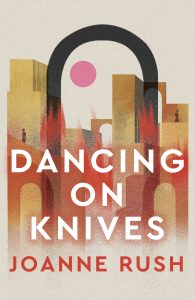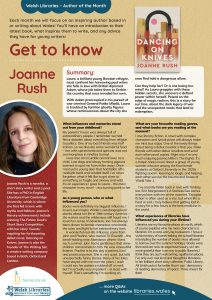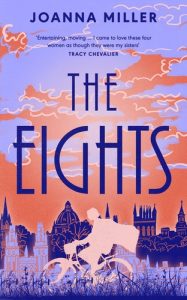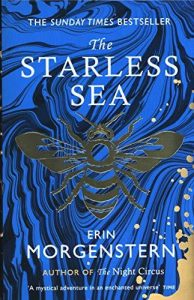Joanne Rush
January 2, 2025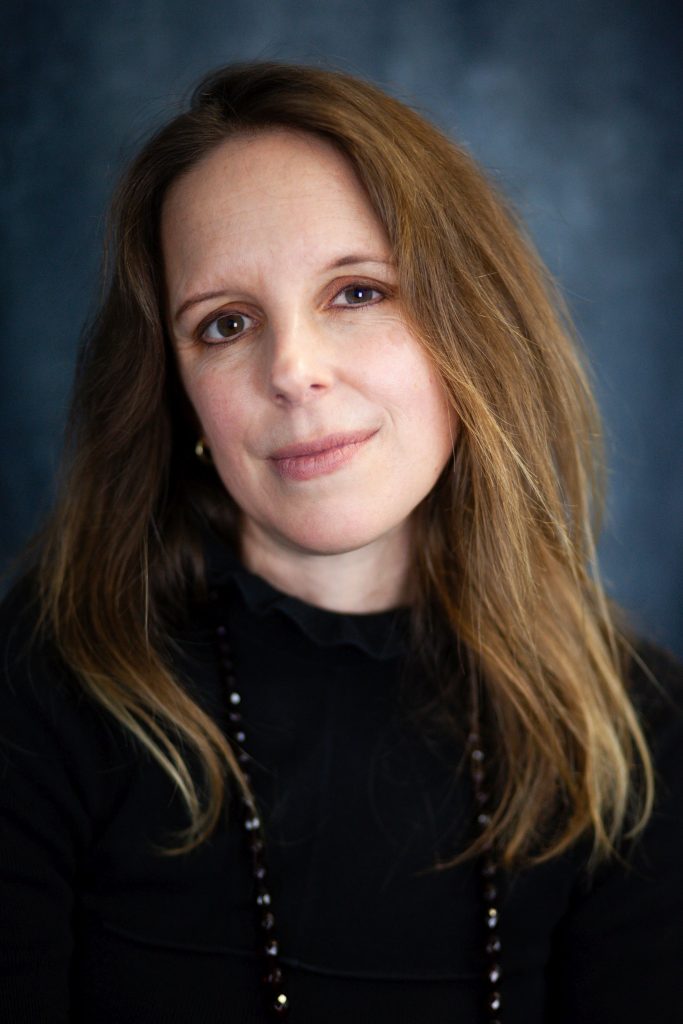
I found out recently that I’m what people from the Llŷn Peninsula call “a swallow”. I grew up in Surrey, but as a child I spent all my summers in Aberdaron – on a smallholding owned by friends. I learnt to collect eggs, feed the pigs and milk the goat. I also fell in love with a beautiful rescue horse; I used to have to hold his food bucket for him, or he’d refuse to eat. Aberdaron is still the place that feels most like home to me. I spend a lot of time writing there. I’ve always wanted to write a novel about Mynydd Mawr, which was an RAF radar station in World War 2…
Later on, I went to Cambridge University to study literature. That was magical in a different way. It truly felt a bit like Hogwarts – from the black gowns and candlelit dinners to the supervisions that took place in a five-hundred-year old turret. I read Tudor poetry in Tudor buildings, and I loved it. The past felt so close that if you stretched out a hand you might touch a ghost.
What influences and memories stand out from your childhood?
My parents’ house was always full of extraordinary people. I remember we had fierce debates about everything from religion to politics. One of my best friends was half Iranian, so we also ate some wonderful food – rice with spiced lamb and apricots was not commonplace in nineties Surrey!
I was also an incurable animal lover as a child. Lost dogs and sleepy homing pigeons seemed to spot me from miles away. Once I rescued a young deer that had fallen off a roadside bank and winded itself. I’ve never forgotten what it felt like to get close to something so fragile and sinewy and wild. It’s an experience I gave to Laura – the main character in my novel – at a turning point in her life.
As a young person, who or what influenced you?
Books were definitely my biggest influence. I loved Laura Ingles Wilder’s autobiographical stories about her life in 19th century America – the wolves and the wilderness still haunt me. I loved her sense of adventure, too. I’ve always been drawn to female characters who break the rules and fight to live extraordinary lives.
A wonderful real-life influence came from John and Pauline, who owned Tir Gwenith – the small-holding near Aberdaron where I lived each summer. John had a gentleness that drew children and animals to him. He was a beautiful listener. Pauline is to this day a patient, kind and practical person. She is very quiet, but tells unexpectedly funny stories. Many of her tales have stayed with me over the years. I wish I could say her patience rubbed off as well, but I’m actually very impatient – at least with myself. That’s something I’m working on.
What are your influences now?
Many, many novelists! Marilynne Robinson’s books help me see the sacredness of the everyday. In different ways, Margaret Atwood, Hilary Mantel, Ali Smith and Jennifer Egan all taught me how fiction can break boundaries and invite us to consider new ways of living.
Recently, I’ve discovered that podcasts offer us a chosen family in a similar way to books. I love listening to Esther Perel’s reflections about how the quality of our relationships defines the quality of our lives, and to Debbie Millman’s interviews with artists and makers on Design Matters.
When did you become aware of wanting to write, did any particular factors play a part?
I have wanted to write for as long as I can remember. As a very young child I used to get ear infections, and my dad would get up in the middle of the night and tell me long, sleepy stories to take my mind off the pain. Making up my own stories was a natural next step, and I still find myself solving questions about plot and character when I can’t sleep.
I moved school at eight years old and was very lonely for a long time. Writing, alongside reading, became a way to escape that loneliness. But story-telling also offered me a chance to connect with people. I have always written as a way to make sense of the world, and I love the power a novel has to make us feel that even at the worst times we are not alone.
Tell us a little about Dancing on Knives. Where did the inspiration come from, and what do you hope readers will take from the story…
Dancing on Knives is the story of Laura, a Bosnian war survivor whose determination to forget the horrors of her past is tested when her husband’s job takes them to Serbia – the very country that invaded her own. As the spirits of those murdered in the conflict resurface, Laura finds herself running a guest house for ghosts. They don’t haunt her; instead they share stories, cook familiar meals, laugh, drink, play cards and tell Bosnian folktales. But as Laura is sucked deeper into their world, she must decide: are her guests a sign that she is unravelling, or can they help her confront the past she has fled for so long?
In 2014, I moved to Bosnia to work for Youth Bridge Global – a charity which uses theatre to bring together young people from divided communities, encouraging friendship and collaboration. Most of the people I met had lived through the war, and all were acutely aware of its ongoing impact on their lives. It was here I began to imagine the novel that would become Dancing on Knives.
I hope readers fall in love with Laura the way I did. She feels things deeply, but she also has a sharp sense of fun and a great ability to bounce back. My second hope is that readers will see in Dancing on Knives a story for our time. Today, conflict on the edge of Europe is a lived reality again. I have tried to draw attention to the grim aftershocks of war, but also to show how a sense of community might be rebuilt – through art, friendship and laughter.
What are your favourite reading genres, and what books are you reading at the moment?
I love literary fiction. A novel with complex characters and lyrical prose will always make me miss bus stops. One of the lovely things about being a debut novelist is that you make friends with other debut novelists and send each other proof copies. Right now I’m very much enjoying Joanna Miller’s The Eights. It’s a hatpin sharp novel about a group of young women who are among the first female students at Oxford University in the 1920s – fighting sexism, learning to laugh, and helping each other survive the trauma and losses of World War 1.
I’ve recently fallen back in love with fantasy, too. Erin Morgenstern’s A Starless Sea comes everywhere with me at the moment. ‘Escapist fiction’ is often used as a slur, but when life is hard or sad, I truly believe that getting lost in a story for a few hours is the best medicine in the world.
What experiences of libraries have influenced you during your lifetime?
Libraries are my favourite places on earth, which of course explains why my main character is a librarian. I’m a card-carrying bookworm. I have a vivid memory of sweet-talking the school librarian into tripling the number of books I was allowed to borrow over the summer holidays. Books were then and are now an expensive luxury, so I am more grateful than I can say to public libraries. I think they are such welcoming, egalitarian places. I’ve only ever met kind and thoughtful librarians. In her brilliant short story collection Public Library, Ali Smith puts it far better than I can: ‘democracy of reading, democracy of space’. Three cheers for that!
What suggestions do you have to encourage children and young people to read more for pleasure?
As a former teacher who now has a nine-year-old boy in her life, I know there isn’t an easy answer to this question. I do suspect choice is key. Can we encourage children to wander round libraries and bookshops – to pick out what they want to read? And can we avoid imposing snobbish hierarchies on books for young people? The difference between “highbrow” and “lowbrow” is simply irrelevant when it comes to reading for pleasure. Do you know Mac Barnett’s TED talk, ‘Why a Good Book is a Secret Door’? I adore it. If I ever make any money from my novels, I want to follow in his footsteps and create a space for children to read and write at the back of a Time Travel shop!
Give us a quote that is at the heart of your life…
I thought about this for an epigraph to my novel. It’s certainly an epigraph to my life!
I get up. I walk. I fall down. Meanwhile, I keep dancing – Daniel Hillel
Thank you Joanne.
Dancing on Knives will be published 30 January by Honno Press.
Read our Get to Know the Author flyer and take a look at our previous Authors of the Month writing in English.

